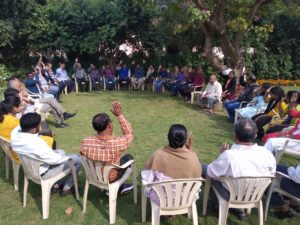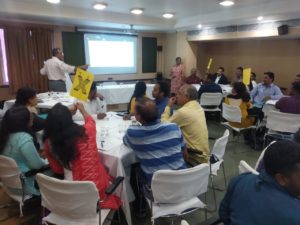Advocacy – A Vehicle for Localising SDGs
 A four-day workshop was jointly organized by CYSD and the National Center for Advocacy Studies (NCAS) on “Localizing SDGs with a focus on Tribal Development” in Bhubaneswar with the objective to provide perspective building, analytical understanding, skill development and experimental learning around Sustainable Development Goals (SDGs) and local governance in the context of tribal development in India. The representatives from civil society organizations, practitioners, public policy analysts, and academic researchers, involved in governance and sustainable development are expected to be immensely benefitted from this capacity building workshop.
A four-day workshop was jointly organized by CYSD and the National Center for Advocacy Studies (NCAS) on “Localizing SDGs with a focus on Tribal Development” in Bhubaneswar with the objective to provide perspective building, analytical understanding, skill development and experimental learning around Sustainable Development Goals (SDGs) and local governance in the context of tribal development in India. The representatives from civil society organizations, practitioners, public policy analysts, and academic researchers, involved in governance and sustainable development are expected to be immensely benefitted from this capacity building workshop.
The broad capacity-building curriculum was framed to promote understanding of SDGs and their relevance in the local context as well as the concept and process of advocacy (Right based Approach). It also gave the participants insight about advocating with different systems of Governance for localizing SDGs in tribal perspectives and ways in which CSOs can contribute to localization of SDGs. 30 participants from various backgrounds including students, academics and middle-level workers from CSOs took part in this workshop.
Good governance encompasses five interlinking aspects: accountability, transparency, participation, non-discrimination, and effectiveness/efficiency. Participation and non-discrimination are particularly important aspects with regard to poor and disadvantaged people. Usually, their opinions and needs are not considered in decision-making. Therefore, the need for pro-active steps taken to ensure the participation was highlighted in the workshop. State is the amalgamation of people, constitution and judiciary. Legislative, executive and judiciary are the pillars of the State. For localization of SDGs advocating them is very important.
The participants were made aware of the Indian Sustainability Index which has been formulated by NITI Aayog and the Odisha SDGs Indicator Framework introduced by the Planning and Convergence Department of the State. The role of civil society as one of the important actors was underlined. The Civil Society works around civil rights and should be held accountable as well as hold other actors accountable.
It was stressed that in order to achieve sustainable progress and results with regard to equity, the human rights-based approach is crucial. The situation of the deprived, and the structural causes of exclusion and poverty, cannot be addressed without providing the deprived with a voice and space to participate in decisions affecting them. Those with the power to shape lives must be accountable to the most deprived if inequities are to be overcome.
On third day, the concept of budget advocacy, legislative advocacy, advocacy with judiciary and media advocacy were introduced. Various parking lot questions based on SDGs, human rights and role of CSOs were answered. On the final day of the workshop, ways of advocating with the bureaucracy were discussed and an exercise of planning on advocacy campaign was conducted.
